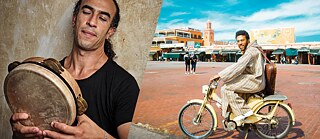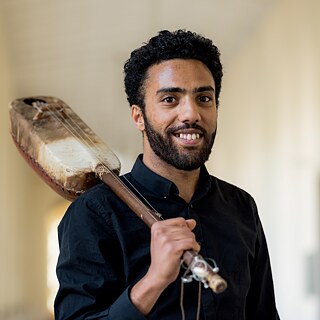“Contrapunkt – Dialog der Kulturen”
Far from the Clichés

What do you think of when you hear “Moroccan music”? And how suitable are such classifications? “The Latest at Goethe” spoke about this with Mohcine Ramdan, who can be heard with his ensemble “JISR - Brücke” in “Contrapunkt - Dialog der Kulturen” by BR-KLASSIK and the Goethe-Institut.
What can the audience expect during the “Contrapunkt” event “Schmelztiegel Marokko” (the Melting Pot of Morocco)?
Mohcine Ramdan: The audience can definitely expect a memorable concert influenced by Moroccan music. We’re an international ensemble; I’m from Morocco, my band members come from all over the world.

Which cliché about Moroccan music annoys you the most?
Mohcine Ramdan: Morocco is categorised as an Arab country, so many people think, “Well, that’s Arab music then.” But that’s not true at all. Morocco has developed in a completely different way, as I’ve already described. The annoying thing is that many people think that the music is always traditional and folkloristic.
You lead the ensemble “JISR – Brücke”. What’s unique about it?
Mohcine Ramdan: The music we usually play at our concerts is unclassifiable. And that’s also the unique feature of this music. The ensemble unites the migration-related musical diversity that’s prevalent in Germany. As musicians, we’re rooted in different musical traditions of the world and we try to transform this into a musical mosaic.
Can you tell us more about the music of the Gnawa?
Mohcine Ramdan: This Moroccan music style is recognised as a cultural heritage by UNESCO. It’s the music of the Black Africans who came to Morocco in various waves as enslaved people and lived in the diaspora. They brought their beliefs and cultural backgrounds with them. This then merged with what was prevalent in Morocco and this hybrid music culture emerged from that. It’s basically similar to the emergence of blues or jazz in America, but with a strong mystical component. The music also serves as a kind of spiritual therapy for the collective trauma of the enslaved of the time.
The interview was conducted by Carla Jamatte, Goethe-Institut e.V.